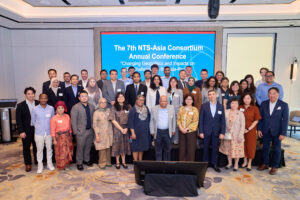Abstract
The Asia-Pacific region is experiencing the effects of rapid geopolitical shifts characterised by intensifying great power competition and emerging conflicts in the last few years. With the theme of “Changing Geopolitics and Impacts on Non-Traditional Security Challenges in the Asia-Pacific”, this year’s 7th NTS-Asia Annual Conference brings together NTS-Asia members and experts from across the Asia-Pacific to deliberate on the significance of such geopolitical dynamics on a wide range of NTS issues in the region, and to explore effective policies to respond to pressing challenges.
The 1.5-day conference features four panel sessions that combine theoretical insights with rich empirical cases. The first panel on Rethinking Security in a Shifting World Order sets the stage by discussing the conceptual foundations of NTS within International Relations and examines how great power rivalry, especially with the return of Trump to the U.S. presidency, reshapes multilateral approaches to address NTS challenges in the Asia-Pacific. The second panel on Climate, Food, and Economic Security then looks at the sectoral implications of such shift, specifically at the intersection of climate change, food security, and environmental resilience in South and Southeast Asia. It discusses how intensifying floods, droughts, and ecosystem degradation brought about by climate change interact with power dynamics, resource politics, and uneven development. With the theme of Community Resilience and Resource Distribution in the Asia-Pacific, the third panel delves into various vulnerabilities facing the region —from the threats posed to urban resilience and refugees arising from conflict areas to the new geopolitics of critical minerals— by discussing how geopolitical tensions are affecting resource distribution and placing new strains on inclusive development, regional stability, and long-term community resilience. Last not least, the fourth panel Digitalisation, Peacebuilding, and Human Security offers an interdisciplinary approach to examine how communities and institutions across the Asia-Pacific are adapting to the interplay between geopolitical changes and digital activism, strategic autonomy and peacebuilding through the lenses of gender and public health management.
The conference will conclude with a discussion on the future agenda for the NTS-Asia Consortium.



 Add to Google calendar
Add to Google calendar
 Add to Outlook calendar
Add to Outlook calendar

